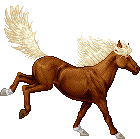Viewing draq4

Father: Unknown
Unknown Pedigree
Hardiness: 1
Appearance: 2
Emerged: 12:21 08.09.2021
Matured: 13:47 10.09.2021
Gleaming coats in rich colors make Ebena Kuranto stand out against the pale green meadows and plains of their preferred habitat. Herds follow no set course in their constant migration, wandering from one lush area to another as they graze. A herd usually consists of a stallion, several mares, and foals. Larger herds may have multiple stallions; in such cases, one male leads while the others serve as herd guardians. Whether traveling or at rest, herds stay close together for protection. Sharp squeals and screams are used to alert each other to danger, often inciting a stampede as the herd flees to safety, whereas high-pitched neighs serve as herd-wide communication. Soft nickers are sometimes heard between mothers and foals. Juveniles remain with their mothers until weaned, after which they generally disperse to other herds, although fillies will sometimes stay. Though skittish and flighty, Ebena Kuranto do have gentle temperaments, and work has begun in training lab-born ones to serve as pack animals or for riding purposes in order to further support field researchers.
The creatures that dwell in this rather desolate world still display some diversity in appearance, eating habits, and social behavior. Whether they have fur or feathers, skin or scales, their unique genetic makeup allows for a variety of colors and markings within each species. Despite limitations in food sources, herbivores, omnivores, and carnivores are all present in the food chain, and each species requires specialized care within a laboratory. Although the artificial setting of housing units and breeding pods precludes most opportunities to study true interspecific behavior, the interactions within and between species has been studied extensively in the wilderness by scientists daring enough to venture beyond the outpost’s walls.
